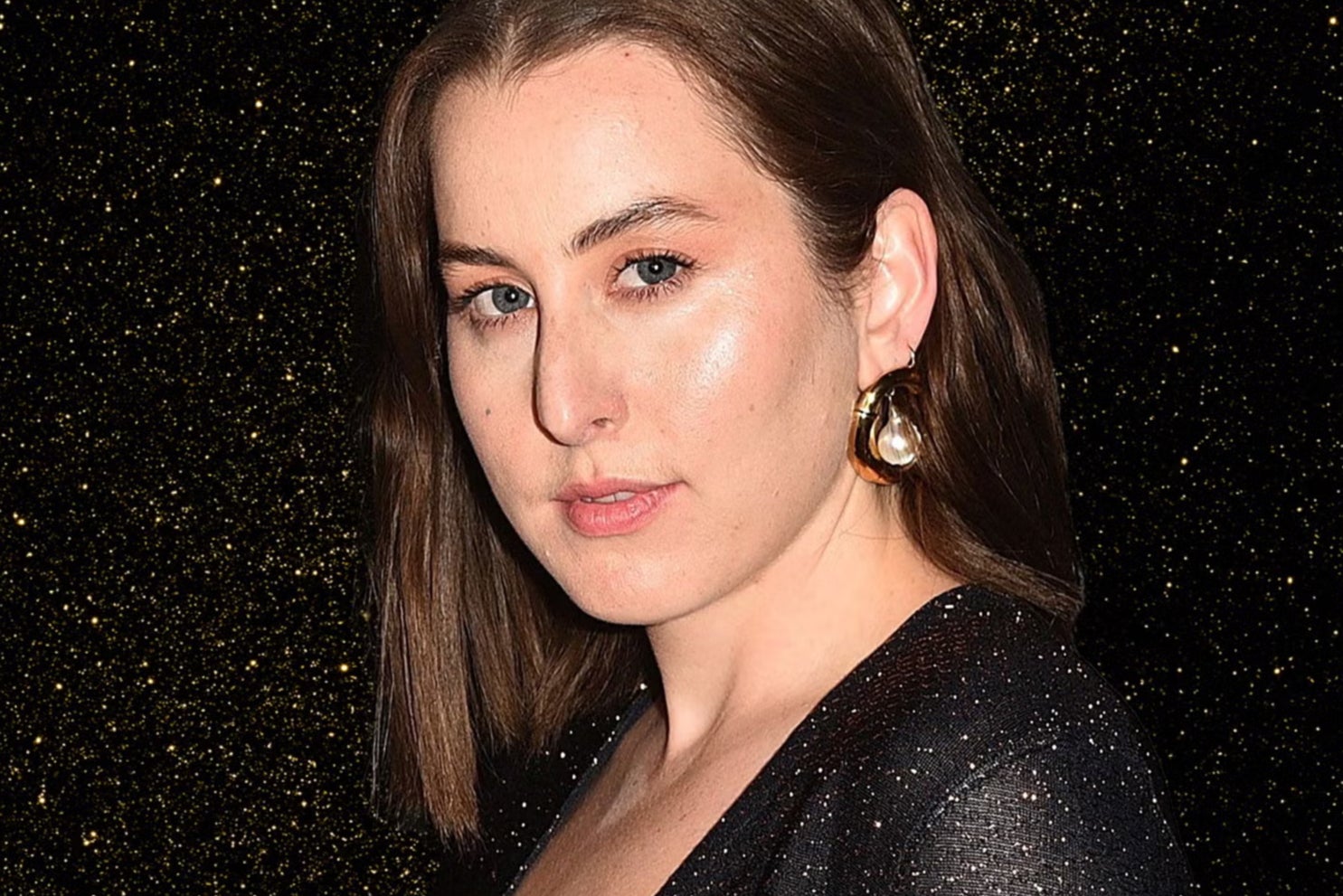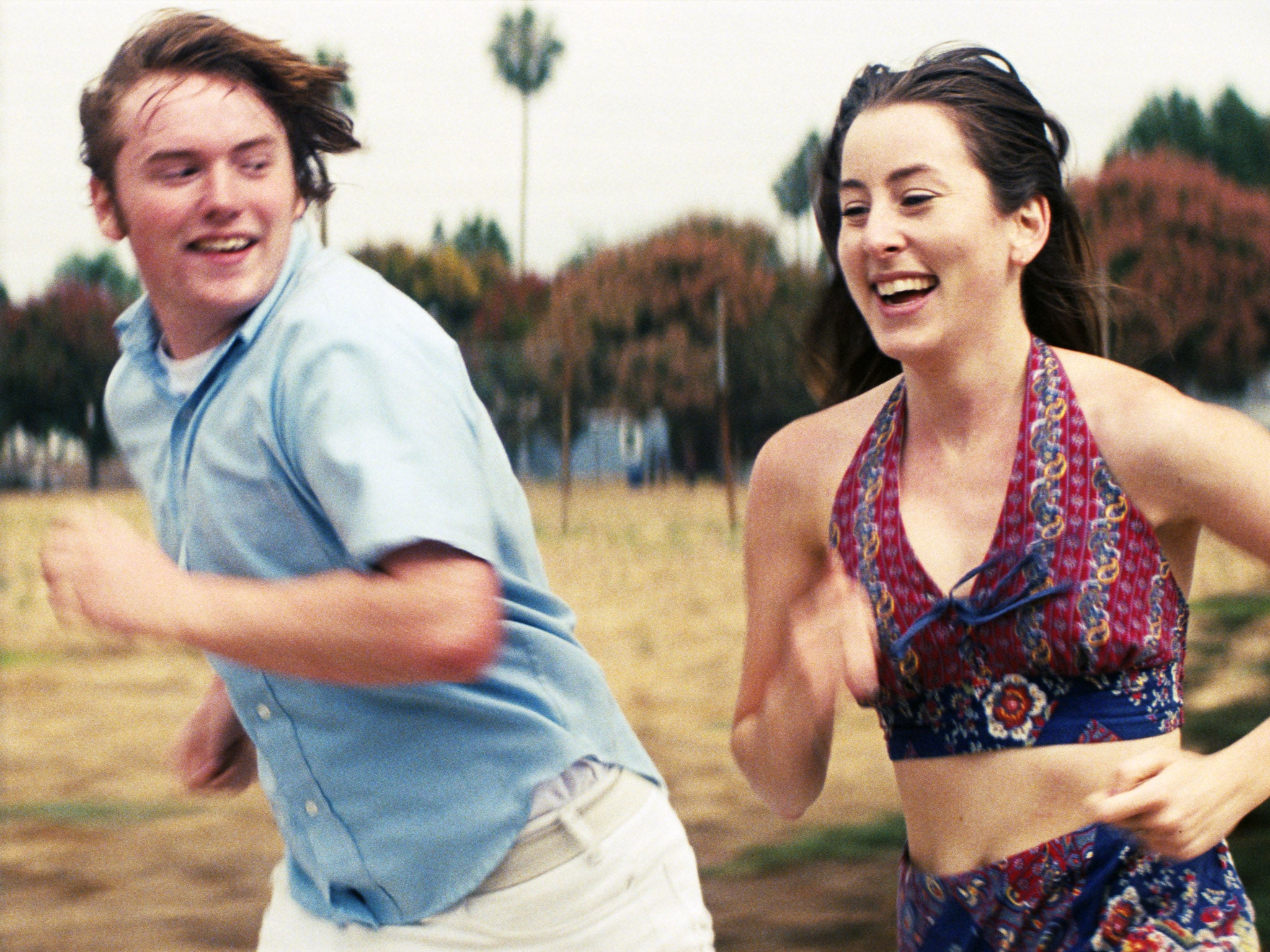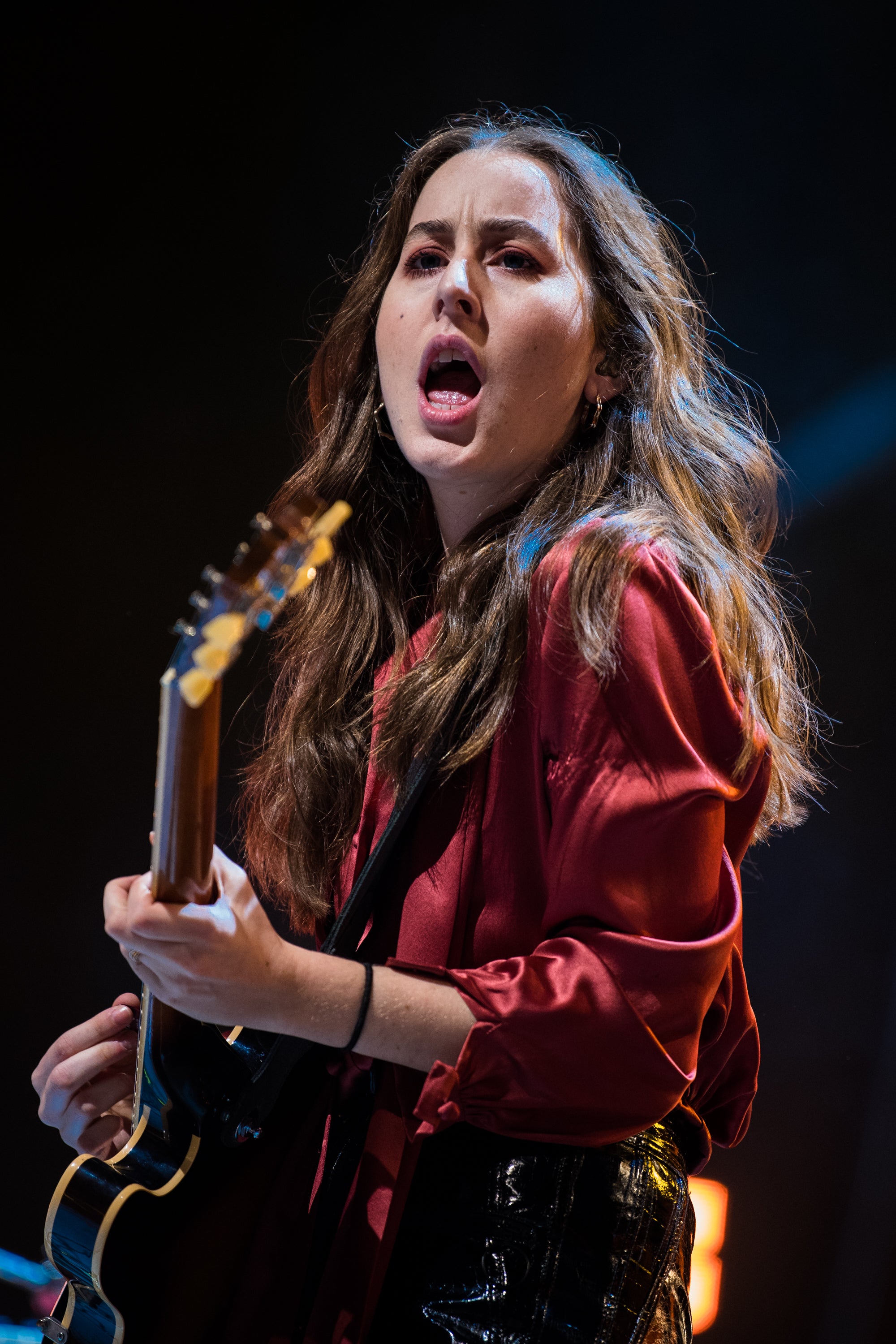Alana Haim: ‘All the big loves of my life have been a f***ing rollercoaster. I’d love one that isn’t’
From one-third of family rock group Haim to Bafta-nominated star of ‘Licorice Pizza’, the Californian has had quite a year. Adam White talks to her about control freaks, growing pains and falling in love


Alana Haim was born in a sneeze. “Like literally,” she says, sitting cross-legged at the centre of a sofa too big for her. “My mom sneezed and her water broke and I just flew out, which is f***ing gross but explains so much – I always feel ill and have the worst sinuses in the world, because I came into it in a sneeze.” Explosive entrances would become a habit. Flash-forward three decades, and the 30-year-old musician – one-third of sisterly rock trio Haim – is a Bafta and Golden Globe nominee for Paul Thomas Anderson’s balmy romance Licorice Pizza. It’s her acting debut, not that you’d know. She’s convinced it’s all her director’s doing. “If you have him on your side,” she says, “you feel like you can conquer anything.”
Haim has flown into London for the latest stop on what must feel like the longest press tour in history. She’s been selling Licorice Pizza since September, and the end of her promotional duties – after the Oscars in March, when the film is up for three awards including Best Picture – can just about be grazed by the tips of her fingers. Today she’s California sunny if apologetic, dressed in sleek black trousers and a knitted jumper, a half-moon pendant given to her by Stevie Nicks dangling from her neck. “I just did the cardinal sin of checking what time it is in New York,” she tells me. It means our afternoon in Covent Garden is her early hours in Manhattan. “This is also a scary f***ing room,” she jokes. She’s dwarfed by a terrifyingly Hitchcockian bird print and a cloudy window she’s convinced has shadow people behind it. “Is my jet lag making me see things?”
Anderson wrote Licorice Pizza – and its main character Alana Kane – for Haim, having directed Alana and her elder sisters Este, 35, and Danielle, 33, in a number of music videos. Their work together tends to fuse tortured melancholy with unadulterated glam, the band always shot by Anderson either strutting down LA sidewalks or wrestling with ennui. Tonally, Licorice Pizza takes up where their shorter collaborations left off. It is a sweaty Seventies-set love story, with listless twentysomething Alana intrigued by the affections of a preternaturally confident teen actor named Gary Valentine (Cooper Hoffman). They get along, sort of. They despise each other, sort of. They have a romance, sort of.
Haim dazzles – her sisters and parents also have scene-stealing supporting roles as Alana’s family – with her performance capturing a specific kind of early-adult growing pain. When you’re 25 – or maybe 28; Alana’s specific age is unclear – it’s typical for life to be a shrug, attraction to curdle into deep embarrassment, and your own urges to make no sense. Haim isn’t surprised that her character’s uncertainty has struck a chord with the film’s fans. Haven’t we all been there? Aren’t many of us still there, even?
“I also went through that stage where you don’t think you’re an adult but you’re considered an adult, and you have no idea what the f*** you’re doing with your life,” she remembers, her voice ebullient and upbeat with a hint of post-flight grogginess. “You’re expected to know all the answers and you have one foot in…” She pauses. “It’s just like the Britney Spears song.” She starts to sing. “‘I’m not a girl/ Not yet a woman!’ That’s totally Alana’s theme song.”
For a while, it could have been Haim’s, too. By the time she’d turned 18, she’d got comfortable being the baby of the family. She’d watched her sisters flourish in school and as musicians, while she’d started drifting aimlessly around their parents’ house. The trio had been playing music together under the names Rockinhaim and then Haim since they were children, but had gone their separate ways as Danielle and Este made their way in the world. Danielle was touring with Julian Casablancas, Este was studying music. Their little sister had hit a wall. “My parents had checked the boxes for them,” Haim remembers. “‘OK, we did good – they both have jobs, they’re both learning, doing their thing.’ And then there was just me. I had nothing.”
She uncrosses her legs, sits up straight and clasps her hands together like a parent giving a stern lecture. “They said to me: ‘What do you want to do with your life?’ I told them I just wanted to be in Haim.” The band was dormant at that point, and they wouldn’t start making music again for two more years. (A well-received EP in 2012 would lead to a major label deal, and their debut album, Days Are Gone, released in 2013, would attract rave reviews and a Grammy nod for Best New Artist.) Haim’s parents supported her grander ambitions, but insisted she had to earn a living in the meantime. So she enrolled in community college, worked at a thrift shop and as a nanny, and sang jingles for radio and adverts. “When I think about Alana Kane, she’s in the same situation. She wants to succeed. She wants to do something. She wants to figure out her life, desperately. But none of the puzzle pieces are falling into the right place.”

In Haim’s own life, things seemed oddly fated. In awed tones, she recounts the strange tapestry of people that led her to Licorice Pizza: many of her teenage radio jingles were produced by musician Asa Taccone, whom she ended up thanking in the liner notes of Days Are Gone; Anderson, who’d heard the group on the radio, scoured said liner notes to see if he recognised any names – he, like the Haim sisters, had grown up in California’s San Fernando Valley and was enmeshed in its modern creative scene – and noticed his friend Taccone; Anderson called Taccone, who called the band, and the director and the sisters began working together. Plus – about a hundred years earlier – Anderson was taught art at seven by Donna Haim, the sisters’ mother. “It’s such a weird origin story,” she says. “Like a movie in itself.” Or, more specifically, a classic 1999 film by Anderson. “It feels like Magnolia! We’re all in our own little worlds, and then we’re all connected by the end of it.”
Licorice Pizza began filming a few months after the release of Haim’s third album, the cheekily titled Women in Music Pt III, in 2020. It’s a record that thrums with defiance, while their interviews at the time were buoyed by a feeling of unapologetic agency over their own work, critics be damned. So did it feel weird to jump straight into another person’s vision? “It was different,” Haim says. “Me and my sisters actually like the term ‘control freak’, because that’s what we are when it comes to our music. We’ve always been that way. But it was nice to go into something where you had no control. Like it was already done. I’m so used to having to think about all of it – writing, recording, touring, lighting – that it was nice to not do anything but act.”
The similarities between movies and music became clearer once Licorice Pizza got released. That’s when controversy arose about the age gap between Alana Kane and Gary Valentine, and whether the film was explicitly endorsing whatever kind of relationship the pair have. By this point in her twin careers, I ask, is Haim used to the public misinterpreting work she’s associated with? Or at least having very different readings of it than what was intended? “More so with music, because I’ve only acted once so far,” she says. “But you’ve gotta let it go. You can’t think too much about what people are gonna say or how they’re going to take things. I feel like it stifles art so much. In terms of music, I think me and my sisters have always wanted to carve our own path. Like, if we ever fail, at least we failed of our own accord.”

As for Alana and Gary, Haim says she understands the impulse to keep going back to someone you love, just to see if this time the outcome might be different. Even if it’s unhealthy, stupid, or confusing to everyone else. “I’d been in love with the same person for basically my whole twenties,” she says, of the on-again/off-again boyfriend that inspired “Another Try”, a yearning mid-tempo track off Women in Music Pt III. “We could never get it right.” The relationship described in that song, much like Gary and Alana’s, feels charged, erratic and indefinable. “Is it destiny or just chemistry?” Haim sings. “Every memory leads back to you.” It’s as if it ought to be captured in widescreen.
“Everyone wants a relationship that feels like cinema,” she says. “Those are the ones that stick. I’ve only had a few…” She pauses, changes course. “I think I’ve only had a few loves in my life. I mean, unless someone comes along and really knocks my socks off and I feel like that’s actually love. But the ones that feel like cinema are the ones that stick with you for the rest of your life. It’s what you strive for. But I hope…” She sighs, crossing her legs again and nestling back into the sofa. “All the big loves of my life have been a f***ing rollercoaster. Tears, laughter, craziness. I’d love one that isn’t. I’d love a nice wave.”
When Haim turned 30 in December, her mother called her in the early hours of the morning – a tradition she parcels out annually to her daughters on their birthdays. “I said I couldn’t believe I’m 30 – I feel like I’m still 13,” Haim recalls. “And she told me, ‘I feel like I’m a kid still, too.’ It was a relief, but also, like… I thought I was going to figure out life at some point? S***, you mean I’m never going to figure this thing out?”
‘Licorice Pizza’ is in cinemas now, and the British Academy Film Awards will screen on BBC One and BBC iPlayer on Sunday 13 March
Join our commenting forum
Join thought-provoking conversations, follow other Independent readers and see their replies
Comments


Bookmark popover
Removed from bookmarks